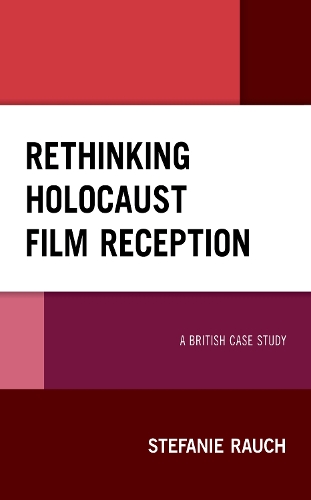
Rethinking Holocaust Film Reception: A British Case Study
(Hardback)
Publishing Details
Rethinking Holocaust Film Reception: A British Case Study
By (Author) Stefanie Rauch
Bloomsbury Publishing PLC
Lexington Books
10th December 2020
United States
Classifications
Professional and Scholarly
Non Fiction
Film history, theory or criticism
The Holocaust
791.43658405318
Physical Properties
Hardback
228
Width 164mm, Height 239mm, Spine 20mm
472g
Description
Taking early 21st century Britain as a case study, Rethinking Holocaust Film Reception: A British Case Study presents an intervention into the scholarship on the representation of the Holocaust on film. Based on a study of audience responses to select films, Stefanie Rauch demonstrates that the reception of films about the Holocaust is a complex process that we cannot understand through textual analysis alone, but by also paying attention to individual reception processes. This book restores the agency of viewers and takes seriously their diverse responses to representations of the Holocaust. It demonstrates that viewers interpretative resources play an important role in film reception. Viewers regard Holocaust films as a separate genre that they encounter with a set of expectations. The author highlights the implications of Britains lessons-focused approach to Holocaust education and commemoration and addresses debates around the supposed globalization of Holocaust memory by unpacking the peculiar Britishness of viewers responses to films about the Holocaust. A sense of emotional connection or its absence to the Holocaust and its memory speaks to divisions along ethnic, generational, and national lines.
Reviews
Film has been a critical dynamo in the formation of cultural memories of the Holocaust over the past generation. Yet for too long the impact of these works has been presumed or speculated. This innovative book provides a much-needed exploration of the complex ways in which Holocaust films and their viewers intersect and interact. Skilfully employing tools from social and cultural studies, Rauch demonstrates how 'a grounded theory of Holocaust film reception' brings new insights and lines of enquiry. As much as Rethinking Holocaust Film Reception enriches our understanding of Holocaust memory in Britain, it forwards a template with broader applicability - opening up fronts for similar research elsewhere and posing new questions about the interplay between memory, education, and representation.
--Andy Pearce, University College London, Associate ProfessorRauch's study on the reception of Holocaust films offers unique insights in how individual viewers relate to various type of knowledge on the Holocaust and it raises key questions for future Holocaust education. Perceptive and stimulating, this book will be an essential resource for researchers, teachers and students interested in visual representations of the Holocaust
--Franciska Louwagie, University of LeicesterThis is a fascinating and unique study of the reception of Holocaust films by actual viewers. It draws on detailed interviews conducted by the author, with very varied findings that often give revealing and unexpected correctives to those of film critics and educators. By supplying this ground-breaking angle on Holocaust cinema, Stefanie Rauch's book promises to change the way we think about learning, commemoration and the films themselves, which range from such well-known works as The Reader, The Boy in the Striped Pyjamas and Conspiracy, to the less familiar Defiance and The Grey Zone. The book carefully elucidates the role of Holocaust memory in Britain while offering an innovative model for approaching questions about audiences' real responses in other national settings.
--Sue Vice, Professor of English Literature, The University of SheffieldAuthor Bio
Stefanie Rauch is research associate at the Institute of Advanced Studies at University College London.
